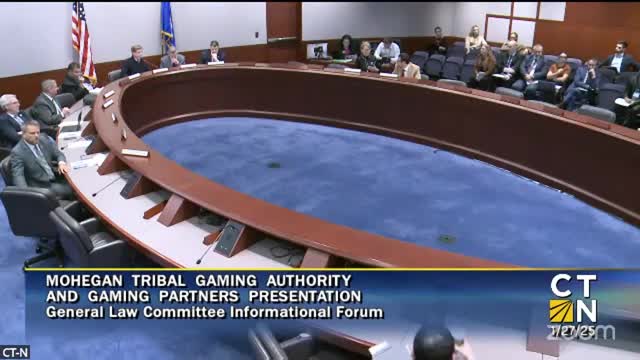Department of Consumer Protection outlines oversight of expanded gaming, self‑exclusion and enforcement against offshore operators
Get AI-powered insights, summaries, and transcripts
Subscribe
Summary
DCP told lawmakers it manages licensing and field inspection for casinos, iGaming and sports wagering, funds several regulator positions via industry assessments, and has stepped up technical and consumer‑protection rules to address offshore illegal operators and game configuration errors.
Connecticut’s Department of Consumer Protection (DCP) told the General Law Committee the agency has built a regulatory framework to oversee casino, online and retail sports wagering and is continuing work to police illegal, offshore operators and reduce technical risks to players.
Commissioner Brian Caffarelli and gaming director Chris Gilming described a gaming division that now manages more than 12,000 credentials, audits gross gaming revenue for state contributions, maintains field staff embedded seven days a week at both tribal casinos, and enforces the Connecticut Voluntary Self‑Exclusion List used for sports wagering, iGaming, fantasy contests and iLottery.
“Since the launch of Expanded Gaming in October of 2021, 7,446 people have added themselves to the Connecticut Voluntary Self Exclusion List,” Gilming said. He added the list remains active for many: “As of this morning, there are still 6,239 people taking advantage of this tool.”
DCP outlined how the agency funds staff embedded at tribal properties: the tribes pay assessments that cover the full employment cost of specific DCP positions assigned to on‑site regulation, Gilming said. He also explained the division’s mix of licensing analysts, investigators and auditors, and that DCP’s gaming auditors reconciled contributions totaling more than $730 million to the general fund last fiscal year.
DCP said it is taking a zero‑tolerance approach to unlawful marketing tactics and to illegal online operators that target Connecticut consumers from offshore. Gilming said DCP has sent cease‑and‑desist notices to 18 illegal operators in the past 11–12 months and that the agency has limited remedies when an offending operator is based overseas. “There’s virtually no recourse when it’s an offshore operator,” he said.
Technical safeguards and consumer protections were also a focus. Gilming said DCP updated technical specifications in January to restrict the use of terms such as “free” where gameplay features can require payment, and that the agency is working with operators to make limit‑setting and self‑exclusion features easier to access inside apps. DCP said some platform misconfigurations have occurred since iGaming launch; the agency investigates reports and requires operators to make affected customers whole when errors occur.
Why it matters: DCP is the primary regulator enforcing compliance across the state’s multiple gaming platforms. The committee heard that while the agency can fine and settle with U.S.‑based unlicensed operators, enforcement is harder with offshore sites that can change names and IP addresses quickly. The volume of online transactions and identified offshore sites has increased the workload for state regulators and consumer advocates.
Committee issues and next steps: Lawmakers questioned how self‑exclusion functions at tribal on‑reservation systems vs. state platforms and asked DCP to continue improving technical standards and advertising rules. DCP said planned updates to operator tooling to ease problem‑gambling steps were scheduled for early February.
